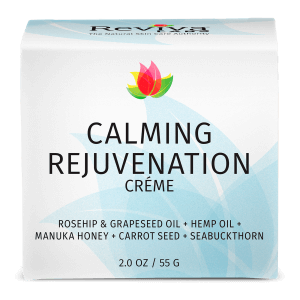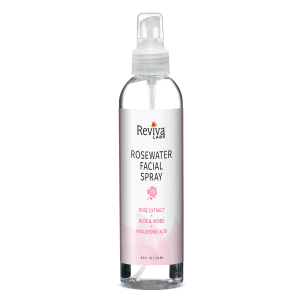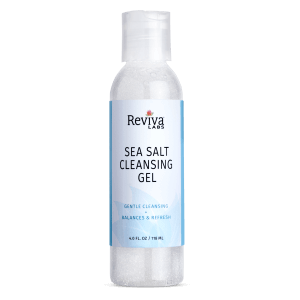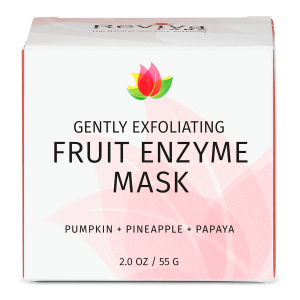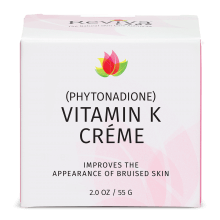Ingredients, Reviva Labs, Skin Care
What Skincare Helps with Redness?
Skincare is a vital aspect of personal well-being, and dealing with skin redness can be particularly challenging. Redness in the skin can be caused by a variety of factors, including sensitivity, irritation, environmental stressors, or underlying skin conditions such as rosacea or eczema. Fortunately, there are numerous skincare strategies and products that can help alleviate and manage skin redness, ensuring a healthier, more even complexion.
Understanding Skin Redness
Before delving into the solutions, it’s essential to understand the underlying causes of skin redness. For many, redness is a temporary reaction to external factors like weather changes, pollution, or certain skincare products. In other cases, redness is symptomatic of conditions like rosacea, eczema, or dermatitis. Identifying the cause is crucial in selecting the right skincare approach.
Gentle Cleansing
The first step in any skincare routine is cleansing, and this becomes even more critical when dealing with redness. Opt for gentle, hydrating cleansers that don’t strip the skin of its natural oils. Harsh soaps and cleansers can aggravate the skin further, exacerbating redness and irritation. Look for products with calming ingredients like aloe vera or chamomile, which soothe the skin while cleansing.
Hydration and Moisturizing
Keeping the skin well-hydrated is key in reducing redness. A good moisturizer helps in repairing the skin barrier, preventing moisture loss, and protecting the skin from environmental irritants. Ingredients like hyaluronic acid, ceramides, and glycerin are excellent for locking in moisture and soothing irritated skin. Apply moisturizer while the skin is still damp to maximize absorption.
Anti-Inflammatory Ingredients
Incorporating products with anti-inflammatory properties can significantly reduce redness. Ingredients such as niacinamide, green tea extract, and licorice root extract are known for their ability to calm inflammation and even skin tone. These ingredients also offer additional benefits like improving skin texture and reducing hyperpigmentation.
Other beneficial ingredients that help with redness and inflammation are Argan oil, Rosehip oil, Jojoba oil, Hemp oil, Ashwagandha, Shiitake, Chinaberry, Turmeric, and Red Seaweed. Each of these ingredients brings unique properties to skincare, particularly in soothing inflammation and improving overall skin health.
Argan Oil
Argan oil, often referred to as ‘liquid gold’, is a powerhouse of nourishment for the skin. Rich in vitamin E and fatty acids, it provides deep hydration and has anti-inflammatory properties. This makes it particularly beneficial for soothing redness and irritation. Additionally, its antioxidant qualities can help protect the skin from environmental damage.
Rosehip Oil
Rosehip oil is renowned for its healing properties. It’s packed with vitamins A and C, which are crucial for skin regeneration and elasticity. The oil helps in reducing redness and inflammation, making it an excellent choice for sensitive skin types. Rosehip oil is also effective in diminishing scars and fine lines, promoting a more even skin tone.
Jojoba Oil
Jojoba oil’s composition is like the sebum produced by our skin, making it exceptionally soothing and moisturizing. It’s known for its calming effect on the skin, reducing redness and easing inflammation. Jojoba oil is also non-comedogenic, meaning it won’t clog pores, making it ideal for all skin types, including oily and acne-prone skin.
Hemp Oil
Hemp oil is gaining popularity in skincare due to its anti-inflammatory and hydrating properties. Rich in omega-6 fatty acids, it helps in calming inflammation and redness, while its moisturizing benefits are ideal for dry or dehydrated skin. Hemp oil can also aid in balancing out oily skin, reducing acne flare-ups.
Ashwagandha
Ashwagandha, a revered herb in Ayurveda, offers significant benefits for the skin. It’s known for its anti-inflammatory and antioxidant properties, helping to soothe skin redness and protect against environmental stressors. Ashwagandha also aids in combating signs of aging by rejuvenating the skin.
Shiitake
Shiitake mushrooms are not just nutritious to eat but also beneficial for the skin. They contain kojic acid, which is known for its skin-brightening properties, helping to reduce hyperpigmentation and even out skin tone. Shiitake also offers anti-inflammatory benefits, helping to reduce redness and irritation.
Chinaberry
Chinaberry, or Melia Azadirachta, extracted from the Neem tree, is renowned for its medicinal properties. It has anti-inflammatory, antifungal, and antibacterial qualities, making it excellent for treating skin conditions that cause redness and irritation. It’s also effective in controlling oil production and clearing out acne.
Turmeric
Turmeric is a well-known anti-inflammatory and antioxidant ingredient. Its active component, curcumin, helps in reducing redness and calming skin conditions like rosacea and eczema. Turmeric also enhances the natural radiance of the skin, reducing dark spots and giving a more even complexion.
Red Seaweed
Red Seaweed, known for its hydrating and soothing properties, is an excellent ingredient for reducing skin redness. It’s rich in vitamins, minerals, and amino acids that nourish and revitalize the skin. Additionally, its anti-inflammatory properties help in calming irritated skin, making it suitable for sensitive and redness-prone skin types.
Incorporating these ingredients into your skincare routine can significantly improve skin health, particularly in reducing redness and inflammation. Each ingredient offers unique benefits, making them versatile for various skin concerns beyond just redness, such as aging, hydration, and pigmentation issues.

Sun Protection
Sun exposure can aggravate skin redness and even lead to further damage. Using a broad-spectrum sunscreen with an SPF of 30 or higher is crucial in any skincare routine, especially for those dealing with redness. Sunscreens not only protect against sunburn but also prevent the aggravation of existing skin conditions that can cause redness.
Avoiding Triggers
Identifying and avoiding triggers is a crucial part of managing skin redness. Common triggers include alcohol, spicy foods, extreme temperatures, stress, and certain skincare ingredients. Pay attention to how your skin reacts to different products and environments and adjust your routine accordingly.
Soothing Masks and Treatments
Incorporating soothing masks and treatments can provide immediate relief for red and irritated skin. Masks containing ingredients like colloidal oatmeal, cucumber, or calendula have excellent calming properties. These treatments can be used as needed to reduce flare-ups and soothe the skin.
Choosing the Right Makeup
For those who wear makeup, selecting products that don’t irritate the skin is important. Mineral-based makeup is often a good choice as it is less likely to cause irritation. Additionally, green-tinted primers or concealers can help neutralize redness and even out skin tone.
Consulting a Dermatologist
If skin redness persists or is accompanied by other symptoms like pain or severe irritation, it is advisable to consult a dermatologist. A professional can provide a proper diagnosis and recommend treatments or products tailored to your specific skin needs.
Lifestyle Factors
Lifestyle factors such as diet, stress management, and adequate sleep play a significant role in skin health. Foods rich in antioxidants and omega-3 fatty acids can help reduce inflammation in the body, including the skin. Managing stress through techniques like meditation or yoga and ensuring enough sleep each night can also positively impact skin health.
Building a Skincare Routine
Building a skincare routine that addresses redness involves selecting the right products and using them consistently. Start with a gentle cleanser, followed by a soothing toner or serum, a moisturizer suited to your skin type, and sunscreen. Remember, consistency is key in seeing results.
Controlling Redness Can Be Done
Managing skin redness requires a multifaceted approach, combining the right skincare products, lifestyle adjustments, and, if necessary, professional advice. By understanding the causes of redness and how to effectively address them, you can achieve a calmer, more even-toned complexion. Remember, everyone’s skin is different, so it’s important to tailor your skincare routine to your unique needs.








